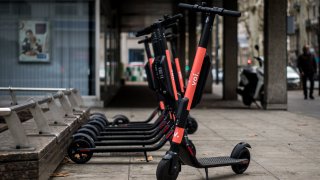
- German e-scooter firm Tier and Swedish rival Voi recently raised mega-funding rounds in excess of $100 million.
- So-called micromobility firms in Europe are outperforming their U.S. counterparts when it comes to fundraising this year.
- Industry executives and investors say Europe is a better fit for such vehicles than the U.S.
LONDON — Europe's electric scooter rental start-ups have been raking in the cash from investors this year, even as their American counterparts were hit hard by the coronavirus pandemic.
German operator Tier last month said it had raised $250 million in a funding round led by SoftBank, lifting the firm's valuation close to $1 billion. It's overtaken U.S. rival Lime to become the second-most valuable e-scooter company after Bird.
Then, Swedish firm Voi on Thursday said it had raised $160 million in a mix of equity and debt financing. The company didn't disclose its valuation, but it is thought to be in the hundreds of millions of dollars.
"U.S. players raised a lot of capital back in 2017 and 2018 at the hype peak for the industry," Fredrik Hjelm, Voi's CEO and founder told CNBC. "All companies and founders were unproven in running this business back then."
"We now understand the business better and what's important: collaborating with cities and winning contracts, operational efficiency and unit economics."
Bird and Lime were the talk of Silicon Valley in 2018, when they raised sizable sums from investors at eye-popping valuations.
Money Report
But U.S. operators faltered earlier this year after the outbreak of Covid-19. Bird and Lime were forced to suspend operations in several markets and laid off hundreds of employees between them to cut costs.
In May, Lime saw its valuation plummet 79% to $510 million in a $170 million funding deal with Uber. An investor in Bird, meanwhile, is reportedly looking to sell shares in the $2.5 billion scooter-sharing giant at a loss.
"First mover advantage and top line revenue might command a frothy valuation for a period of time," Paul Murphy, general partner at venture capital firm Northzone and an investor in Tier, told CNBC.
"But eventually growth investors will value the underlying health of a business and how efficiently they'll be able to grow."
Europe outperforms the U.S.
Venture capitalists appear to be more confident about Europe's micromobility market than that of the U.S. Micromobility refers to small forms of urban transport, such as electric kick scooters and bikes.
Pitchbook data shows investors have injected $371 million into U.S. micromobility firms since the start of the year, while European rivals have raised $687 million.
Compared to the U.S. and Asia, Europe is the only region to show growth in venture investment in the sector so far in 2020, up around 64% from 2019 levels.
"We are seeing European e-scooter startups doing much better than their American counterparts," Asad Hussain, mobility analyst at Pitchbook, told CNBC.
The business model of U.S. e-scooter firms is more operations-heavy than European rivals, Hussain said. He added that the Europeans' relationship with regulators and government spending on bike lanes and other infrastructure makes the region "a much better market for micromobility than the U.S."
"It's not rocket science that European cities are a much better fit for this type of product than U.S. cities," Henri Moissinac, CEO and founder of Amsterdam-based e-scooter firm Dott, told CNBC.
"In the U.S., they're so entrenched in the car world … I think it's a better fit for Europe."
Then there's the coronavirus pandemic, which though hit the scooter-sharing space hard at first, is now the catalyst for some countries accelerating adoption.
Take the U.K. for instance. It has been illegal to ride an e-scooter on British roads because of a law dating back to 1835, but the government has fast-tracked trials ahead of new regulations to make them legal for the first time.
Several scooter hire companies — both European and American — have won bids to take part in the trials and are now hoping to win contracts in London, which will be a key battleground.
Lime bounces back
Some investors say that European e-scooter start-ups are a more lucrative bet than their U.S. competitors as they are leaner and have better economics.
Moissinac said Tier and Voi's recent funding rounds are "a sign that the European companies are doing a better job than the U.S. companies, at least in Europe."
Tier and Voi both say they've been profitable since June, a rare show of sustainable growth for a sector that has typically been viewed as very capital intensive.
But the U.S.' Lime, too, has managed to reach profitability, bouncing back from its issues earlier in the year. Lime says it's been encouraged by Tier's near-$1 billion valuation, as it does three-to-four times as much business as the German firm and operates globally.
"Lime is the leading micromobility company by nearly every measure, both globally and within Europe," Ghassan Haddad, head of policy for EMEA at Lime, told CNBC.
"As the first new mobility player to achieve a full quarter of profitability on an EBITDA basis, Lime has no need to fundraise as we're reinvesting our profits to deliver new hardware, new modes and expanding to new cities across Europe and beyond."
Bird was not immediately available for comment when contacted by CNBC.






